The story of madness allegedly by Adèle Hugo , the daughter of Victor Hugo begins one day in the year 1863. She loses company with her father, then in exile, and embarks for Halifax in Canada, where the regiment of an English officer with whom she is in love is stationed:Albert Pinson . To free herself from the servitude in which her father keeps her, she is ready for anything. Even to persuade oneself of a love that does not exist... The legend is on the march.
This is what suits the affairs of Victor Hugo . Make Adèle look crazy rather than admit his acts of independence which discredit him. A father bruised by the madness of his daughter, isn't this more in line with the image of the exemplary father that he wishes to give to his contemporaries and leave to posterity?
Victor Hugo, despite all his qualities that we can deny, is a great neurotic like many geniuses. And he has a bad flaw:selfishness.
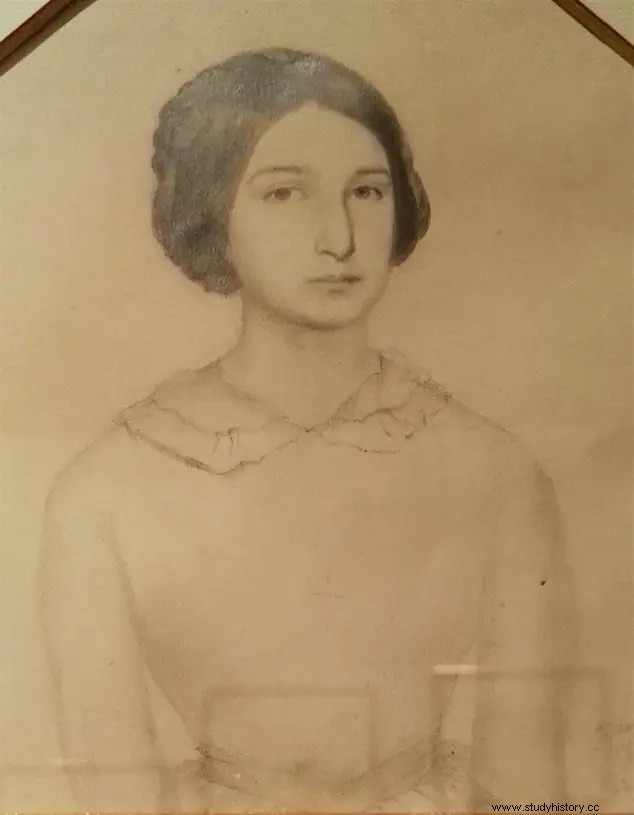
A disastrous family pattern
Adèle Hugo, last child of the couple formed by Victor Hugo and Adèle Foucher, was born July 28, 1830 (before her were born Léopoldine, Charles and finally François-Victor). The Hugo couple is struggling. This same year, in fact, Sainte-Beuve, friend of Victor Hugo and godfather of the little one, became his mother's lover .
Adèle Foucher tries to break up after the birth of Adèle. But tortured between passion and duty , between freedom provided by her lover and loyalty to Victor whose personality crushes her, she offers her daughter, for 7 years, those of her childhood, the spectacle of an unstable mother consumed by her passions.
When Sainte-Beuve finally disappeared from her mother's life, Juliette Drouet bursts into his father's.
The young Adèle remains deeply marked by the loves of her father during the critical adolescent years. This tyrannical and inaccessible father, capable of giving himself with passion to his mistresses, but not to his family.
👉 To read also:the women of Gustave Eiffel
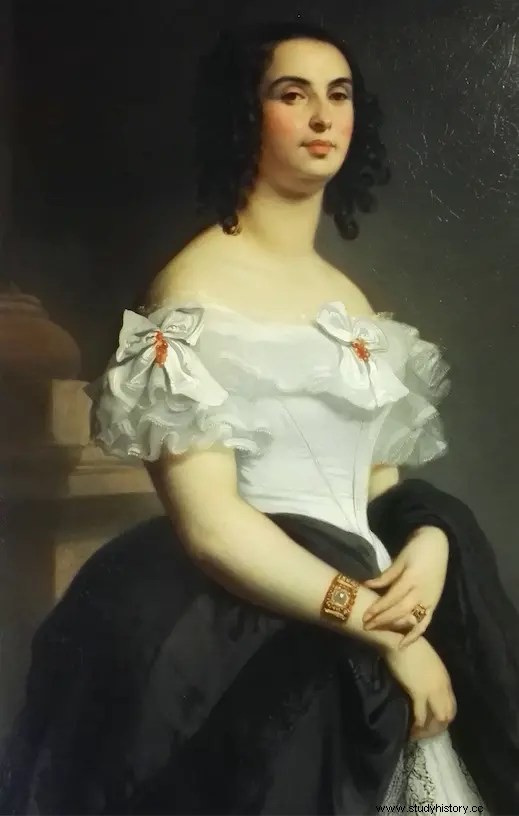
Adèle clings to her older sister Léopoldine, to whom she is very close. When Léopoldine drowned in 1843 , at the age of nineteen, some time after his marriage, it is the tragedy. Adèle, known as "Dédé", will never recover from the loss of "Didine".
How, in this disastrous family pattern, can she build herself normally?
Adèle Hugo transforms into a magnificent young woman , who lets her romantic feelings overwhelm her. Dubbed "the greatest beauty" by Balzac, she has a silky mane of black hair and beautiful dark eyes. Contemporaries are full of praise. Adèle falls in love with the painter Eugène Delacroix , by the sculptor Auguste Clésinger , then Auguste Vacquerie . About men, she wrote in a Journal she kept from March 1852:
They are bland, incomplete:then they are not men, because for me, a man is hardly a man unless he has genius, virile beauty, and an iron nature.
Exile of the Hugo family to Jersey
At the beginning of 1852, for having accused Napoleon III of high treason, Victor Hugo was condemned to exile . It is unthinkable that his family does not share his fate, so the whole family does not take long to leave France.
They first meet in the island of Jersey :Auguste Vacquerie, Adèle's transfixed lover, is present. A whole group of outlaws keep them company.
At 23, Adèle is one of the most courted women on the island. She goes to all the parties:we see her at the carnival costumed as Louis XV , her beautiful black hair powdered with white. The marriage proposals follow one another.
The only one that catches Adèle's attention is that of a certain John Rose "I was on. I had my gooseberry dress, my beautiful jewel, my tulle veil, my black coat, I was ideal. But she refuses to commit “I wasn’t madly in love enough, I was only in love. Moreover, there was the Other”.
The other is Auguste Vacquerie, whom Adèle forgot in the summer of 1854, when she met a young English officer, Albert Pinson . It's love at first sight. They see each other several times, especially during spiritualist seances which Victor Hugo loves, and Adèle notes in her Journal:
I love you because you are English, royalist, blond, matter, past, sun. I have no merit in warming the genius fire but I have glory in melting the snow.

Hauteville House, the tomb of Adèle Hugo
In 1855, Victor and his family settled in Hauteville House, on the island of Guernsey located between France and England. It is a house lost in the middle of nowhere, overlooking a cliff where the ocean is agitated. Landscape of tragedy which gave Victor Hugo the serenity necessary for the composition of his masterpieces (Les Contemplations , Les Miserables …).
On the other hand for Adèle, this exile signifies the beginning of the end. Victor Hugo imposes on his daughter, passionate and prone to melancholy, complete isolation. An appalling loneliness that is not proper to the development of a young girl, especially so sensitive.
Adèle Foucher, a resigned wife, nevertheless protests against the treatment inflicted on her children, and immediately notices that her daughter is experiencing this new exile worse than the others. But what can she do? She has long been subject to the will of her husband. She is, like her children, under his affective and moral influence.
The young woman lives in an extraordinarily monotonous regularity. To a friend, Marie de Villeneuve, she wrote:"My life always flows as happily and cheerfully as dark exile allows".
To drown her melancholy, she plays the piano . And divinely well. She interprets Brahms, Chopin, Beethoven, Mozart.She is a virtuoso. She composes for concerts or sets her father's poems to music. Great portrait painter also, she produced admirable caricatures and oil paintings offered at charity sales for the benefit of exiles. She pretends that she is fulfilled by this artistic activity, but everyone realizes how overwhelmed she is.
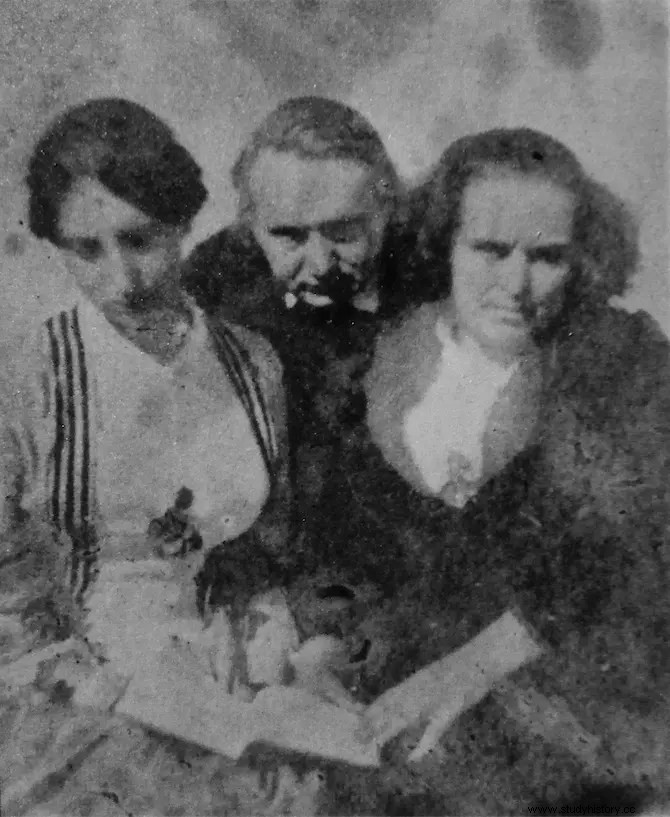
It is then said that the first signs of his mental derangement appear. In fact, she is going through a severe depression. Dark, she no longer goes out, settles mechanically at the piano or in front of her easel, absent. She hardly eats anything.
On December 6, 1856, a nervous attack made her delirious for 4 days and 4 nights. She recovers, and goes back to the piano, but writes less and less in her notebooks, remains alone locked up in her room and no longer responds to invitations, she who loved going to balls so much!
During these 11 years of exile (11 years!), from 1852 to 1863, she clung to the only two things she had left:the piano and the passionate love that Albert Pinson inspired in her.
In 1861, during a trip to London, the handsome officer made her understand that he had no plans to marry her. She writes him a letter that begins with:“We could have been happy” and ends with “At our marriage or at my death”. Indeed, Adele gives him a few more days to accept, threatening to commit suicide if he does not respond. Pinson gives no news. His melancholy becomes terrible. Is there no one to rescue her from this place where she is wasting away?
Her mother wants her to travel to Paris to distract her, but Victor opposes a categorical refusal:out of the question that his family dissociates itself from his cause by breaking the exile! She manages to snatch authorization from Hugo in 1882. But Adèle, constantly chaperoned by her mother, knows that she must return to Guernsey. His father is waiting for him, reproving.
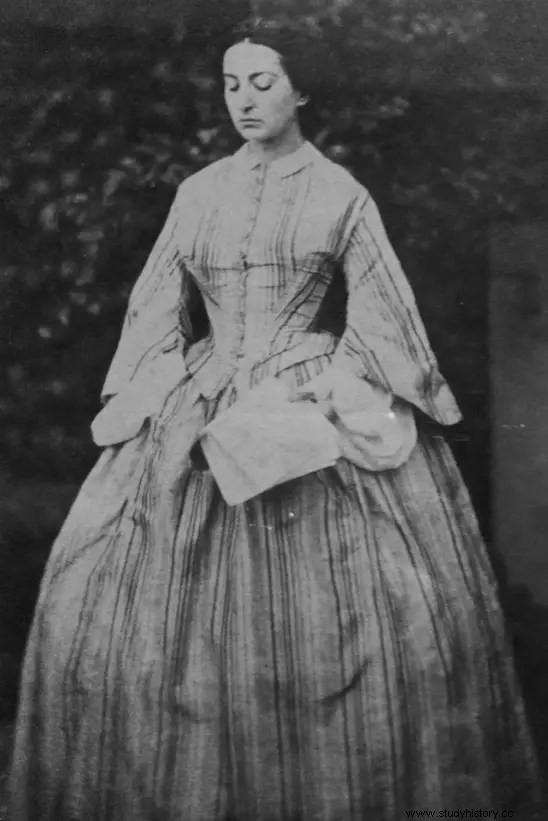
Flight to find Albert Pinson
The return to Guernsey quickly becomes unbearable for him. On that famous day in 1863, Adèle fled to Canada in Halifax to be closer to Albert Pinson, leaving a note for her father. Victor has very strange words when he sees this running away:"She hates me". As if he couldn't stand the idea of no longer having his daughter at his disposal.
On September 17, Adèle wrote to her mother to inform her of her marriage:“My darling. I am married. I am still under the impression of the event and I am writing to you very soon so as not to miss the post. The news appears in the Journal, under the instigation of Victor Hugo, all friends are informed. But Victor Hugo and Adèle Foucher do not receive the documents authenticating the marriage. Victor admits, "This son-in-law's first concern seems to be to make himself impossible. That is. Is he, in fact, my son-in-law? I am reduced to asking myself this question. His silence says no”.
François-Victor, Adèle's favorite brother, writes a funny letter to his mother when he learns that his sister is not married:"Carefully burn this after reading it. Adèle deceived us as she deceived everyone. The marriage is not done. She admits it in a letter, specially addressed to me, where she declares, moreover, that the marriage, publicly announced, has become absolutely necessary (…)”
Pinson himself wrote to Victor Hugo,confessing his astonishment news read in the newspapers. He affirms that he has no intention of marrying Adèle, and that he never asked for her presence with him in America.
Soon, Adèle is moving to the West Indies, to Barbados . She always seems to be running after the hope of marrying Albert Pinson. However, she resumed writing to her family… Her mother died on August 27, 1868 of a stroke without having seen her daughter again. We're starting to talk about Adèle's madness.
In a letter, strangely missing, and addressed to Victor Hugo, the Consul of France in Barbados admits:"There is a madwoman here who calls herself your daughter". We would have seen her haggard, wandering like a lost soul in outfits unworthy of his person, disheveled hair, unable to take care of himself, having forgotten even the most elementary gestures of personal hygiene.
Victor Hugo writes to his son François-Victor:"Let her return, and at the same time that my heart will blossom, my arms will open". His return is the condition. In the meantime, he wallows in silence, does not answer any of her letters and forbids his brothers to travel to see her.
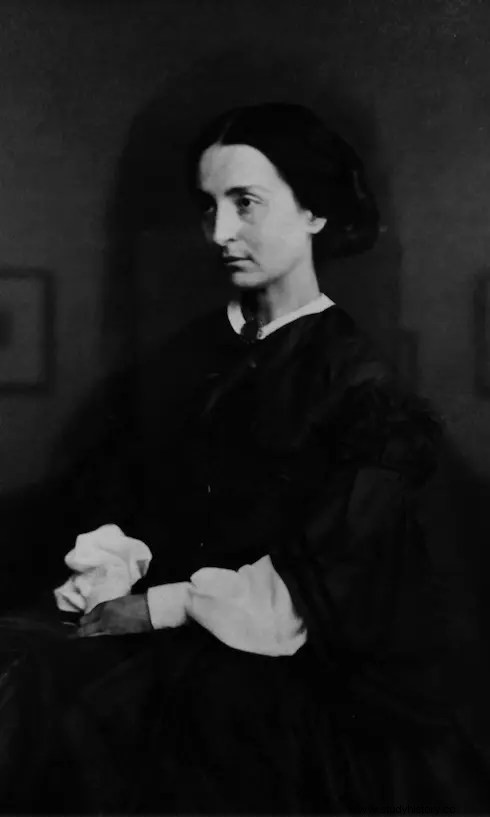
The return and internment of Victor Hugo's daughter
In 1870, Albert Pinson married Catherine Edith Roxburgh and left the army. The Hugos are convinced that Adèle will return. She did not return until much later, in February 1872, by steamer to Saint-Nazaire. Hugo claims that she no longer recognizes her brothers, and immediately places her in a nursing home , at Madame Rivet's in Saint-Mandé, near the Bois de Vincennes, an asylum reserved for women. An internment that must remain secret , but which was unveiled in 1882, the year which was also that of Victor Hugo's last visit to his daughter.
After the death of Victor Hugo in 1885, Auguste Vacquerie, Adèle's first lover, became her guardian and hastened to have her transferred to the Château de Suresnes , the best nursing home in the region. He assigns him a flag, hires him the services of servants.
How did Adele Hugo die? His death on April 21, 1915, in a context of world war, goes almost unnoticed. Adèle Hugo, last survivor among her brothers and sisters, dies at 85 declaring, "Ah, my name is so heavy to bear!" ". His last words revealthe distress of his whole life…
👉 To read also: Notre-Dame de Paris , the rescue in prose of Victor Hugo
Questioning Adèle Hugo's madness
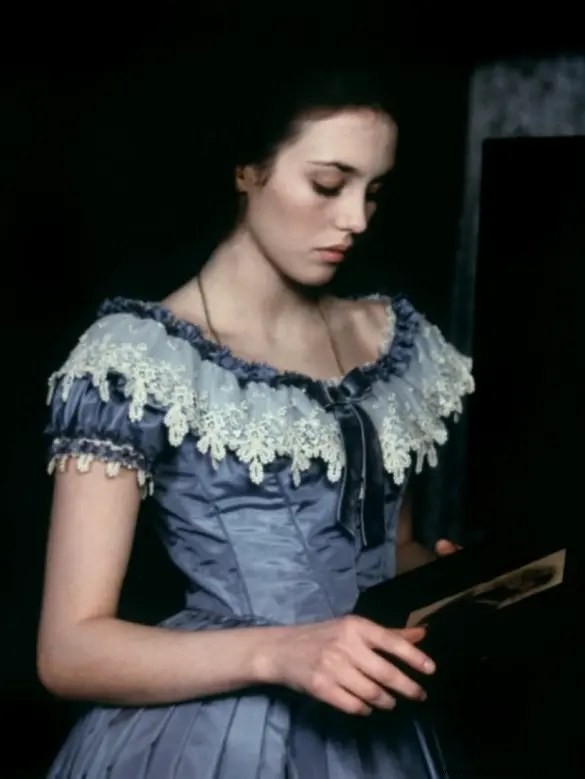
- The systematic destruction of Adèle’s letters
The vast majority of letters sent by Adèle have disappeared. Out of 100 letters, only 7 were found. And none when he left Halifax and settled in the West Indies. However, during this period she often wrote, as evidenced by the texts left by her brother François-Victor.
Strangely, in a family that strives to keep the slightest note exchanged, and which "archives for posterity" the slightest draft of the father, the letters sent by Adèle after her escape are systematically and conscientiously destroyed. Were they made to disappear in order to be able to establish Adèle's madness without danger of seeing evidence that she had all her mind?
Even the medical reports showing changes in Adèle's behavior during her successive internments have all disappeared...
- Adèle's behavior in the West Indies
Blind, Victor Hugo persists in seeing in his daughter's flight the consequences of an "absolute mental disorder". What is it in reality? From Halifax she leaves for Barbados, without a regret, quite able to organize herself between the payment of postage, the comings and goings between the Bank of North America and the post offices.
In the West Indies, she leads a perfectly normal and nonchalant life . The letters sent to her brother François-Victor bear witness to this:she is well, she likes the climate, she is impatiently awaiting a crate of clothes and above all, she keeps asking her mother for a visit. She also remains very flirtatious :one day she receives a dress of a certain color that she likes, and asks for a piece of the same fabric to make a matching scarf.
- An obvious desire to bury Adèle’s memory
Hugo talks to his daughter about illness, bewilderment . The truth is that the independence Adèle seeks is unbearable for her.
The king of romantics could tolerate an attitude dictated by madness, he could not tolerate or even conceive of his daughter evading voluntarily in its grip.
So he erases his memory, which tarnishes the reputation of the family , he "bury her alive" where she had the bad idea to go into exile. Otherwise why would Victor Hugo, who often visited his sick brother, refuse to take the boat to go to see Adèle ? And forbid his children and his wife to travel? Why would he always send letters to his sons, asking them to convey his words to Adele, and never to Adele in person ? Why would he stubbornly never answer to his letters?
In his notebooks, he feels excessively sorry for Adèle's fate, for her madness, etc. As if trying to convince himself , and wanted to leave irrefutable traces for posterity.
His son François-Victor himself, who acts as the intermediary between his father and his sister, sends purely formal letters . He asks no questions about Adèle's activities, her schedule, and is content to send her the subsidies she needs. Period. We don't want to know anything more.
- Letters of Albert Pinson
We still have letters from Albert Pinson intended for Adèle. He is surprisingly tender with the young woman. He reassures her, tells her anecdotes, hears from her and gives her advice, worries in particular about the effects that the climate of the West Indies could have on her health, urges her to find her family. Would he continue to correspond with her if he knew she was crazy ? On the contrary, wouldn't he have cut all ties definitively?
- Testimonies of contemporaries
Those who have seen Adèle in her nursing homes do not report any abnormal behavior to the point of being able to speak of madness. A reporter for Figaro , Camille Cincholle, wrote on discovering Adèle in Saint-Mandé:
Adèle Hugo is doing well, she reasons correctly, gets along perfectly with her comrades, remembers everything, but she sometimes has strange behaviors.
And so to underline for example that she stuffs everything she finds in her pockets and particularly likes pebbles:for 1 month she removes one by one the pebbles from a long driveway then puts them back in another. Is that enough to call her mad? This disturbed young girl, who must be bored to death , there are occupations. Fortunately, he was brought a piano which enabled him to continue composing! Why did Victor intern his daughter whom he could very well have taken care of?
Jean Hugo, grandson of Charles, Adèle's second brother, visited his great aunt, which inspired him a few unpublished lines :
When my father visited her, she confused the generations and took him for Charles Hugo, her brother. She showed few other signs of unreason. She often went to concerts with her companion.
That she confuses the generations is hardly surprising for a woman who is kept reclusive, who loses the notion of time a little. Again, is that enough to call her crazy? A case that would have interested many psychiatrists of our time, and of which we would have liked to know the verdict... They would certainly have concluded that there were psychosomatic disorders.
Be that as it may, another testimony describes a 55-year-old Adèle, occupying her days like a normal woman :she reads, she gardens, she walks, she listens to operas...
Adele Hugo, crazy? We will never know the end of the story. She was a troubled and anguished woman, victim of her passions, because disturbed by an unhealthy childhood and youth . Victor Hugo bears an overwhelming responsibility, it must be recognized. She was beautiful, she was young, she wanted to live free, and her father probably couldn't stand it...
